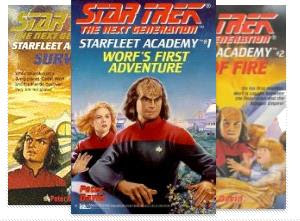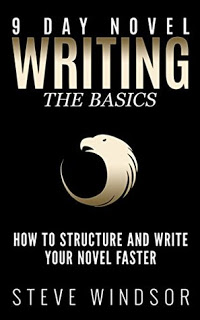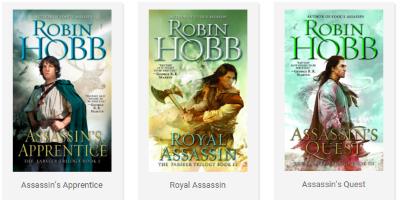
The first thing to notice about
Robin Hobb's writing is that it's good. Characters are well written and well embedded in the scenes, scenes are well described, albeit sometimes too well, the world is well defined and the story feels both original and familiar, so it wasn't difficult to enjoy reading the three books in
the Farseer series. Sure, there were issues with the story that I felt frustrated about, and I am afraid to say that it comes from the female perspective of the writer, more than not, but overall it was really difficult to put down once I started reading it.
The main character of the story is the bastard of a royal prince, next in line to the throne, that is being brought by the maternal father to the prince's doorstep. It's yours, you take care of him, that sort of thing. The poor mother had nothing to say in the matter, although why that stayed like this for the rest of the story is unclear. Immediately the existence of this child leads to major changes: his father doesn't come to see it or recognizes him in any way, but abdicates from his royal position and retires to the country, where he is subsequently murdered. The child is raised by the prince's most loyal man, a stableman that is tasked to the boy's care by the prince himself before his death. The old king takes a fancy to the boy and keeps him at the castle if he agrees to become a King's loyal man and become the apprentice of the royal assassin. Several other things happen that see him trained in fine writing, royal intrigue, sword fighting and so on.
Another important aspect of the story is the magic. The Farseer royal line, meaning the king and his sons, are strong in the Skill, something that gives them mostly power over other people or the ability to see or communicate at great distance. There is another type of magic that comes from the mountain folk called the Wit, which is the ability to communicate and even bond to animals. The latter is seen as disgusting and sometimes criminal and many a person was put on trial and killed for having a talent in this type of magic. Guess what? The bastard has both talents.
So it starts like the normal fantasy young adult plot, where the main character is a hapless child that discovers he has superpowers, but Hobb makes this as an unpleasant experience as possible for him: lost friends, jealous uncles that see him as next in line for the throne if ever recognized by royalty, a tragic attraction for a childhood friend, the moral dilemmas associated with being an assassin, deceit, torture, and so on. I will not spoil the book for you, so I will stop here.
The thing that annoyed me the most about the book was the inconsistency in some matters. One moment he is a berserker brawler attacking with a big ax and killing dozens, the next he is traveling everywhere carrying swords or staffs and having fear of two or three people. At one moment he is a trained assassin, the next he can't figure out how to kill people. At one time he blows a powder in someone's face and they immediately die, the next he doesn't know how to kill people that he routinely gets close to, one moment the love of his life is the most important thing, the next he ignores her for a few months while he does stuff for the king. Also, he is loyal to a fault, while everybody else, including his wife and his so called teachers, treat him as a child and keep essential information and training from him. This gets worse and worse as you get closer to the end of the story. The first book was wonderful, the second gets more inconsistent and the decisions of the characters are really weird and the third is filled with
WTF moments. The most annoying thing of all is the ending, which features some spectacular sacrifices that are completely invalidated a few pages later on.
Bottom line: the kid is much more effective, smart and logical when he is a child. As he goes through puberty he gets worse and worse until his only skill seems to be listening to what others say and obeying for no good reason. If you don't like the books too much, be happy that the story ends satisfactorily with the three books, if you do like the writing and the world Hobb describes, there are many other books set in
the Elderlings world, including a sequel trilogy to the Farseer one called
Fitz and the Fool.
 This book was recommended by Jeff Atwood, of Coding Horror and Stack Overflow fame. He liked it, I wasn't impressed. In The Last Policeman, Ben H. Winters attempts to describe a world that is powerlessly waiting for the arrival and impact of a 7km wide asteroid. While smaller than the one that killed the dinosaurs off, it would still pretty much end human civilization and most of the life on Earth. As a result, people are killing themselves in depression, quit jobs to "go bucket list", nothing is working, nothing gets repaired, etc. In all of this, a detective is trying to solve a case that looks like just another suicide, but he feels it's not. It is an interesting concept and it was well written by Winters, but I had difficulty believing in the world he was describing. More than that, except rumors of something Iran is planning there is no mention of any other country. I believe that in this situation a lot of people would inertially and routinely continue what they were doing until they figured out that it doesn't make sense (and that probably it didn't make sense to begin with), but there would certainly be more aggressive social changes that the author completely ignores. Plus that "going bucket list" would certainly become frustrating once you can't go on a cruise because no one is sailing the thing or you can't enjoy your favorite food because the restaurant got closed.
This book was recommended by Jeff Atwood, of Coding Horror and Stack Overflow fame. He liked it, I wasn't impressed. In The Last Policeman, Ben H. Winters attempts to describe a world that is powerlessly waiting for the arrival and impact of a 7km wide asteroid. While smaller than the one that killed the dinosaurs off, it would still pretty much end human civilization and most of the life on Earth. As a result, people are killing themselves in depression, quit jobs to "go bucket list", nothing is working, nothing gets repaired, etc. In all of this, a detective is trying to solve a case that looks like just another suicide, but he feels it's not. It is an interesting concept and it was well written by Winters, but I had difficulty believing in the world he was describing. More than that, except rumors of something Iran is planning there is no mention of any other country. I believe that in this situation a lot of people would inertially and routinely continue what they were doing until they figured out that it doesn't make sense (and that probably it didn't make sense to begin with), but there would certainly be more aggressive social changes that the author completely ignores. Plus that "going bucket list" would certainly become frustrating once you can't go on a cruise because no one is sailing the thing or you can't enjoy your favorite food because the restaurant got closed.












